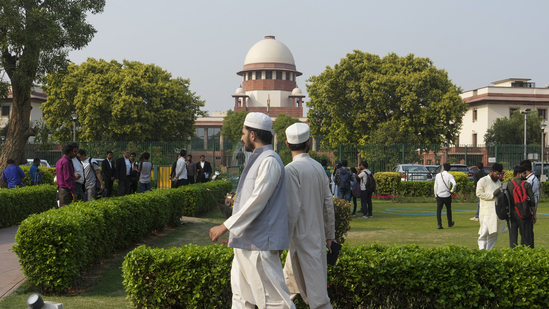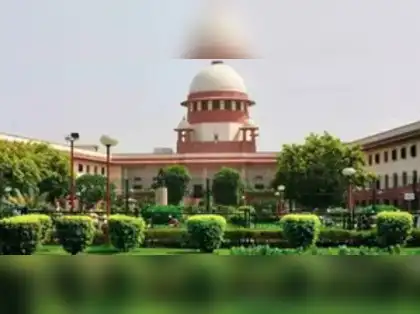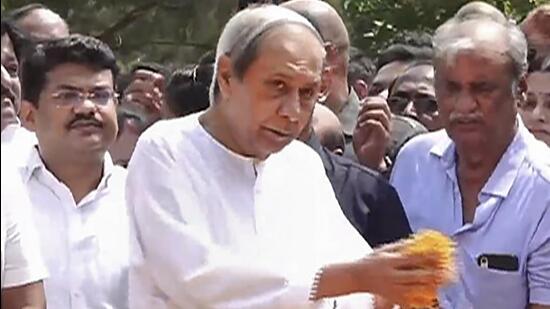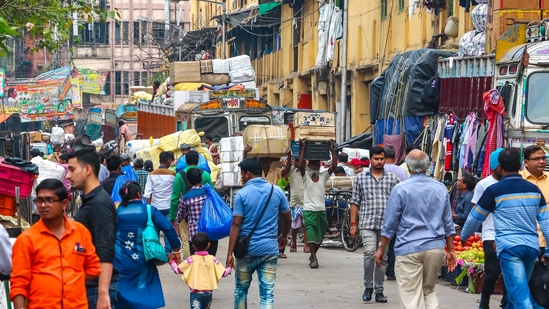On Thursday, the Supreme Court agreed to look into whether Muslims can choose to follow India’s secular succession laws for their properties instead of Sharia law, without having to give up their faith. A man named Naushad KK from Kerala’s Thrissur district filed a plea asking for this choice.
Naushad’s petition argues that Muslim individuals should have the right to decide how their property is passed on after they die. He wants the court to allow Muslims to create wills (which are documents that tell how to distribute their belongings) that follow Indian laws instead of Sharia law, which has some restrictions.
Right now, under Sharia law, a Muslim can only pass on one-third of their property through a will. The rest must go to family members through fixed Islamic rules. This can be very limiting. Naushad believes that this restriction goes against the Indian Constitution, which supports equality and personal freedom.
His plea highlights that Muslims should have the same freedom to make wills as everyone else in the country. It talks about how religious laws shouldn’t force someone to follow rules they don’t believe in. For example, if a Muslim gets married under the Special Marriage Act—a secular law—they aren’t bound by Islamic marital laws. So, if they choose to make a will, it should be recognized too.
The petition also asks the government to think about changing laws to ensure everyone can decide how to handle their property, regardless of their faith. The Supreme Court has combined Naushad’s case with similar pending cases, including one from a woman named Safiya P M, who does not identify as a believer anymore and wants the freedom to manage her own property.
Author: Rasmita Jena
-

Supreme Court to Review Muslim Rights in Succession Laws
-

Punjab Kings’ Boosting Win: Haddin and Bhuvneshwar Discuss Team Spirit
Bengaluru, India: Punjab Kings assistant coach Brad Haddin is confident that their recent big win against Kolkata Knight Riders (KKR) has given the players a boost. They dismissed KKR for just 95 runs after scoring 111 runs themselves. Haddin said this victory helps the team believe they can win from any situation, which is important as the IPL gets closer to the finals.
However, Haddin emphasized that this win is just a starting point. “It’s crucial to improve with each match. Our upcoming wins are very important because the competition is tight,” he explained. He wants the team to build on their momentum and play bravely.
Haddin is proud of the explosive batters in his team and hopes they remain calm during tough moments. “We have a strong batting line-up, and everyone knows their role. They can change the game quickly. But they need to focus and do their best,” he said.
Speaking about the pitch conditions, Haddin mentioned that the bowlers can be strong on certain pitches, and it helps the batters understand the game better. “We talked about being clear in our plans and playing deeper in the game,” he added.
## Comments from Royal Challengers Bangalore
RCB bowler Bhuvneshwar Kumar noted that the pitch at M Chinnaswamy has been more bowler-friendly lately. He said, “This pitch isn’t like it used to be. We will bat or bowl for a few overs and then decide how to play.”
Bhuvneshwar also mentioned that he hasn’t been using saliva to shine the ball even though the ban was lifted. “I forgot, but I’ll remember for tomorrow’s game,” he said.
He praised RCB captain Rajat Patidar for keeping the team calm and united, especially during tough times. “It’s important to stay calm and not panic after losing. Rajat has managed things well,” he concluded. -

He Xiaopeng: The Future of Electric Cars with XPeng Motors
He Xiaopeng might not be a household name in the West yet, but he’s making waves in the global car industry. Known as the “Chinese Elon Musk,” he founded XPeng Motors, a high-tech electric vehicle (EV) company that’s helping China lead in electric cars.
Electric Cars in China
China’s electric car market is growing really fast! Right now, 50% of all cars sold in China are electric or new energy vehicles (NEVs). Last year, 55.7% of these had special features that allow some hands-free driving, kind of like Tesla’s self-driving cars. Just in 2014, these numbers were below 1%. He said in an interview, “China has made huge progress in the last ten years.”
In comparison, only about 11% of cars sold in the United States are electric, and Europe is doing a bit better at 23%.
His Story is Similar to Musk’s
He Xiaopeng’s journey to success is a lot like Elon Musk’s. After selling his mobile browser company, UCWeb, to Alibaba, he used his money to start XPeng Motors in 2014. Just like Musk, who invested in Tesla after selling PayPal, He is also working on smart technology. He created special chips for self-driving cars, built a humanoid robot called “Iron,” and even wants to develop flying cars!
However, XPeng is not as big as Tesla yet. Tesla has been well-known around the world for a long time. XPeng faces tough competition in China from other companies like BYD. But He is hopeful about the future and wants more than half of XPeng’s sales to come from other countries in the next ten years, aiming to be China’s top brand for mid to high-end electric cars. -

Government Bans Changes to Waqf Properties Until Court Hearing
On Thursday, the Indian government told the Supreme Court it won’t change or cancel any waqf properties or make appointments to the central waqf council and boards until May 5. Solicitor General Tushar Mehta made this promise to Chief Justice Sanjiv Khanna and Justices Sanjay Kumar and K.V. Viswanathan. He emphasized that the waqf law was carefully discussed when it was passed by Parliament and that any changes should happen after the government has a chance to explain.
The government strongly opposed the court’s idea to temporarily stop changes to waqf properties and to prevent non-Muslims from being part of the council and boards. Throughout the hearing, Mehta mentioned the government wants to respond to the issues raised within seven days. He reassured the court that nothing concerning waqf properties, including those used privately, would be changed or canceled until the next hearing.
The Chief Justice pointed out that if any waqf property was registered under the old 1995 law, it cannot be canceled until further notice. On the previous day, the Supreme Court considered stopping some crucial parts of the new law that allows for the denial of properties declared as waqf by courts and includes non-Muslims in the central waqf councils.
Mehta questioned if the court would be considering stopping a law without fully discussing it first, stating that such actions are uncommon. He explained that the government had received many requests, which ultimately led to the amendment of the law. He argued that halting the law could be a serious step and asked for time to provide a detailed response.
In light of this, senior advocate Rakesh Dwivedi said there wouldn’t be any major issues if the court did not pass an interim order immediately. The Chief Justice affirmed that they want to keep things stable, stating that Parliament makes laws, the executive carries them out, and the judiciary interprets them.
The bench decided to focus on five out of the total 72 petitions submitted against the Waqf (Amendment) Act, 2025, which includes cases from several prominent groups and leaders. The judges appointed three lawyers to represent the petitioners and allowed them to file their responses to the government’s reply within five days.
The Chief Justice had previously expressed concern regarding including non-Muslims in the waqf councils and questioned whether the government would consider including Muslims in Hindu temples. He proposed an order that properties classified as waqf by courts should remain untouched while the case against the Waqf Amendment Act is heard.
Waqf by user means that a property can be recognized as a religious or charitable gift based on its long-term use for such causes, even without a formal written agreement from the owner. The new amendment was officially recognized on April 5. -

Naveen Patnaik Urges Focus on Odisha’s Growth Amid BJP Tensions
Bhubaneswar: Former Odisha Chief Minister Naveen Patnaik, who also leads the Biju Janata Dal (BJD), spoke out on Thursday about the importance of focusing on Odisha’s growth instead of disrespecting its heroes. He emphasized that history cannot be changed just because someone wants to. Patnaik’s words came during a gathering to remember his father, Biju Patnaik, on his death anniversary.
He did not specifically mention the ruling Bharatiya Janata Party (BJP) or Chief Minister Mohan Charan Majhi, but his comments follow reports of vandalism at Biju Patnaik’s statues and the renaming of many projects that originally honored him.
In response, Odisha BJP President Manmohan Samal said Patnaik’s comments were just political talk and that they respect Biju Patnaik. He also said it was not right for a former chief minister to make such statements.
Naveen Patnaik is expected to become the BJD president for the ninth time on April 19, as no one else has registered to challenge him. However, the BJD is struggling to find leaders for 15 districts because of disagreements within the party. Some party leaders are even considering starting a new political group soon.
Senior BJD leader Ranendra Pratap Swain has urged Patnaik to make important changes in the party, saying it has lost touch with its supporters. He wants to prevent a few individuals from taking control and causing problems within the party and spreading regional unfairness. -

CRPF Launches New CoBRA Battalion to Fight Terror in Jammu & Kashmir
The Central Reserve Police Force (CRPF) has decided to create a special CoBRA battalion to fight terrorism in Jammu and Kashmir. This decision comes 17 years after the CoBRA unit was first formed to deal with Naxal problems in certain Indian states.
During the 86th Raising Day event of the CRPF in a historic town in Madhya Pradesh, the Director General of CRPF, Gyanendra Pratap Singh, made this announcement. The event was attended by Union Home Minister Amit Shah, who was the chief guest.
The new CoBRA unit will help improve the CRPF’s operations in Jammu and Kashmir. It will specifically work in forest areas where terrorist attacks have happened recently. Earlier this year, some CoBRA companies were trained in the Kashmir valley but were not sent into action. For now, regular CRPF teams and a special squad called the Kashmir Valley Quick Action Team (QAT) are working to fight terrorism there.
The CoBRA unit was started in 2008-09 to handle problems related to Left Wing Extremism (LWE) in various Indian states. By 2011, there were 10 CoBRA battalions, and now this will be the 11th unit, focusing on Jammu and Kashmir. The commandos in this unit are highly trained in jungle warfare and guerrilla tactics. They use modern weapons and technology, and the unit is always updated with younger members to keep it effective.
Currently, most CoBRA units are operating where Maoist activities are strong, especially in Chhattisgarh, as the government aims to eliminate this threat by March next year.
The special jungle warfare unit was created by IPS officer K Durga Prasad, who had experience with a similar unit called the ‘Greyhounds’ in Andhra Pradesh. The first CRPF battalion was raised in 1939 during British rule and renamed as the Central Reserve Police Force in 1949 by India’s first Home Minister, Sardar Vallabhbhai Patel. -

US Schools Face Control: Will They Fight for Their Independence?
School districts all across the United States are facing a tough choice like many colleges and universities: Either let the government control what they teach or stand up for themselves and risk losing money from the federal government. Harvard and Columbia took different paths, but one lesson is clear: they need to fight back.
The Trump administration has been tricky to negotiate with. Each time schools try to discuss issues, the government changes its demands. After negotiating with Harvard for a while, the government sent a letter with outrageous demands. They wanted Harvard to share private information about hiring and admissions, change the university’s operations to push certain viewpoints, and limit the influence of students and faculty whose views didn’t match the administration’s preferences.
The government claimed it was defending students from unfair treatment, but it’s clear that their main goal is to control what happens in education. For example, just a week earlier, the Department of Education sent letters to school superintendents requiring them to cut any programs focused on diversity, equity, and inclusion or lose funding.
Federal funds help pay for things like schools for low-income students and programs for kids with disabilities. But now, the government is threatening to take away the money if schools continue these programs, without saying exactly what would be considered illegal practices.
If the government truly cared about fairness and civil rights, they could investigate schools for real violations of laws and allow them to correct any problems. Instead, they’re trying to control education by telling schools what to teach and who to hire. This could lead to schools silencing ideas, banning books, and cutting programs they don’t agree with.
At first, many schools were scared to take a stand because they rely on federal funding. But they soon realized that cooperating wasn’t getting them any real benefits. Columbia University learned this after it tried to negotiate for $400 million in government help. They allowed the government to meddle in their Middle Eastern studies program, but then the government demanded even more.
Harvard, on the other hand, decided to hire lobbyists to assist them. They cooperated when the demands seemed reasonable but didn’t back down when the requests became excessive. Harvard President Alan W. Garber emphasized that no government should control what universities teach or how they operate.
In retaliation, Trump’s administration threatened to cut $2.2 billion in federal aid to Harvard, with more funds at risk afterwards. They even considered taking away the university’s tax-exempt status. Harvard, which has a huge $53 billion endowment, is prepared to fight back legally.
Now, K-12 schools are facing the same dilemma: bow to the pressure to keep their funds or fight back, knowing it may cost them. Eleven states led by Democratic governors have refused to comply with the government’s demands, while sixteen others have said they will.
Education leaders are speaking out against these federal actions, saying they threaten free speech and fairness. For example, one superintendent pointed out that equity, which helps all students succeed, should not be seen as a threat.
Educators like Washington State Superintendent Chris Reykdal are questioning the government’s right to demand these things from schools. He made it clear that they will not accept demands that take away their power to run their own schools.
This funding struggle may move to court soon, with the government likely continuing to issue more letters. But Harvard and state leaders are showing a strong message: it might be tough to fight back, but giving in is even worse. -

Nifty Realty Index Rises: DLF Leads Gains Amid Mixed Market Performance
“NEW DELHI: The Nifty Realty index went up on Thursday, showing positive signs for real estate stocks. DLF Ltd. saw the biggest rise, going up by 2.01%. Other big gainers included Mahindra Lifespace Developers, which rose by 1.61%, Phoenix Mills with a 1.01% increase, Raymond Ltd. up by 0.77%, and Prestige Estates Projects climbing 0.65%. However, not all stocks did well. Sobha Ltd. dropped by 0.55%, while Godrej Properties fell by 0.46%. Macrotech Developers saw a 0.38% decline, and Oberoi Realty was down just a bit by 0.05%.
The Nifty Realty index finished at 845.1, an increase of 0.51%. The main Nifty50 index also performed well, rising 414.46 points to reach 23851.65 points, while the BSE Sensex rose by 1508.91 points to 78553.2. Out of the 50 stocks in the Nifty index, 44 stocks went up in value, and only 6 went down.
Vodafone Idea, IDFC First Bank, YES Bank, Eternal, and Tata Steel were among the most traded shares on the NSE today. Some companies, like Oswal Agro Mill and ICE Make Refrigeration, reached new highs over the past year. On the other hand, companies like Vikas Multicorp and Gensol Engineering hit new lows.
Stay updated with NiftyStat for more financial news!” -

Delhi Capitals Triumph in Thrilling Super Over Against Rajasthan Royals!
On Wednesday night, April 16, 2025, at the Arun Jaitley Stadium, Mitchell Starc shined bright as he helped the Delhi Capitals win a thrilling Super Over against the Rajasthan Royals. But before that, there was another important moment that many might not have noticed, and it involved wicketkeeper KL Rahul.
In the 14th over of Rajasthan’s chase for 189 runs, Kuldeep Yadav bowled to Yashasvi Jaiswal, who had already scored a half-century. Just before the second ball was bowled, Rahul made a quick signal to captain Axar Patel. This led to an important change in Starc’s fielding position at long-on. It was a smart move!
Kuldeep bowled a slightly slower ball to Jaiswal, but he didn’t hit it high enough, and it ended up in Starc’s hands. This crucial play helped Delhi keep Rajasthan from chasing down the runs in 20 overs. Instead, the match ended in a tie, leading to a Super Over where Starc once again showed off his skills to help his team win.
With this exciting victory, Delhi Capitals climbed to the top of the points table with five wins out of six matches, earning 10 points. They had just bounced back after a loss to the Mumbai Indians last week. In contrast, the Rajasthan Royals remained at the eighth spot, winning only two out of seven games.
Next, Delhi will face Gujarat Titans in Ahmedabad on Saturday, while Rajasthan will host Lucknow Super Giants in Jaipur on the same day. -

29 Children Rescued in Thane: Calls for Stronger Protection Measures
Thane, Maharashtra – A shocking report came out when 29 children were rescued from a shelter home in Thane after someone complained that they were being hurt and abused. Neelam Gorhe, a high-ranking official in the Maharashtra legislative council, is pushing for more CCTV cameras in these kinds of facilities to ensure children’s safety.
Gorhe noticed that all the kids from the shelter claimed to live at a ‘railway station,’ which she called “very strange.” She questioned if this was true or if someone had made up their addresses. She asked police to closely check the home addresses of kids in schools to find any unregistered or illegal shelters.
On April 11, 20 girls and 9 boys were saved from an unapproved hostel in Khadavli, Thane, after reports of abuse. Five people were charged under laws that protect children. Gorhe visited the rescue home to make sure the children were safe and told officials to inspect all shelters for minors across the state.
She emphasized that the government must act decisively, ensuring that strong lawyers are hired to make sure the attackers face serious consequences. Gorhe also said that the kids need proper schooling and emotional support, explaining, “They deserve a safe place to learn and grow. We cannot let their futures be ruined.”
She instructed welfare officials to keep in touch with the rescued children, help them with online classes, and organize fun activities to help them feel better. To prevent future problems, Gorhe insisted on more CCTV in shelters, reviewing past abuse cases, and ensuring skilled legal help is available. She reassured everyone that the state is committed to protecting children and ensuring they are heard and empowered, stating firmly, “We will not tolerate crimes against children.”